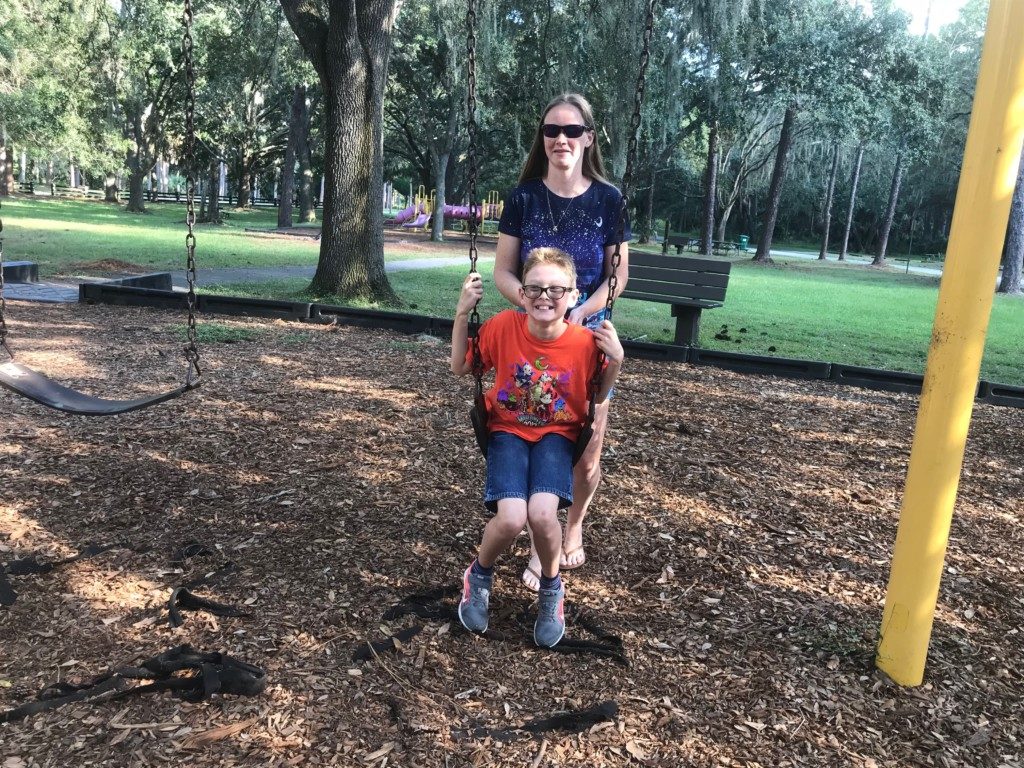
Carrie Balazy and her son, Kenneth. Thanks to the nation's first reading scholarship for public school students, the family has greater resources to improve Kenneth's reading ability.
Kenneth Balazy, 10, learns differently than your average student. He has ADHD and executive functioning disorder. As a result, he easily becomes distracted and finds it hard to focus in class.
A 9-year-old Sanford resident, whose mother wanted her name withheld, struggles with a learning disability, where it takes a little longer for her to grasp the meaning of a lesson.
And English is not Camila Cabazos’ first language, making key concepts in learning hard to comprehend for the 10-year-old Sarasota native.
All three students share a common challenge: they struggle in reading comprehension and need more one-on-one help to overcome obstacles in learning. But parents say it has not been an easy road to find that needed help. Private tutoring is not something many can afford on a consistent basis. The parents say schools do offer help, but not enough to meet the needs of their children.
Now, these parents have a new place to turn: They have been found eligible for the first voucher in the nation aimed at helping public elementary school students who struggle with reading.
To qualify for the scholarship, a student must be in third through fifth grade, enrolled in a Florida public school, and have scored below a Level 3 on the English Language Arts assessment this past spring. Priority under the law is given to students who are designated as “English Language Learners.”
The first-year appropriation is $9.7 million, which can serve more than 19,000 students. The scholarships are awarded on a first-come first-served basis.
The Children’s Reading Foundation, a national nonprofit that includes community-based reading chapters, estimates that 74 percent of such struggling readers will not be able to catch up.
In Florida this past year, 44 percent of third- and fourth-grade students – a total of 191,220 – failed to pass the state English Language Arts Assessment.
***
Kenneth enjoys reading The Wimpy Kid series and The Dog Man.
The affable kid with glasses and light brown hair donning a Halloween Disney shirt becomes engaged when speaking about reading. He especially loves how his imagination comes to life when he opens a book.
But there are obstacles. Difficult vocabulary and reading comprehension leave him stumped, he says, displaying a question mark symbol that he raises above his head.
“My son can read,” said his mother, Carrie Balazy, a New Port Richey resident. “That’s not the problem. But the stress and emphasis on passing these FSA tests is taking the enjoyment out of it for him.”
Kenneth loses interest quickly. He is distracted by the smallest of things. It makes tests even more of a challenge.
“The schools are not able to hold him back, and they just keep moving him forward,” Balazy said. “His school is offering support but it is not enough. He is flying under the radar all these years. He is the real quiet child just barely getting by. Now it has caught up to him.”
Balazy tried tutoring but it simply was too expensive for the family of five living on one income.
She worries about sending Kenneth to middle school because he is not able to keep up with his peers on test results. When she learned of the reading scholarship on TV, she stayed up all night to ensure her son received one of the first placements.
“This scholarship will give Kenneth the opportunity to take advantage of reading programs or tutoring centers to help find the specific skills he’s lacking in and focus on improving them so he can pass these tests easier in the future,” Balazy said.
***
Amanda Ayers knew that it took her daughter longer to learn reading concepts than most other students. She describes her as a slow learner.
Her daughter would become discouraged when other students were faster at picking things up than her, Ayers said. She also shied away from checking out books at the library because she was intimidated to read.
She put her daughter in some intervention programs at school and even tried tutoring. But, like Balazy, she found the programs were much too expensive.
This was a difficult predicament for the parent of two children with learning disabilities. When she learned of the reading scholarship program through her daughter’s school, her spirits lifted.
“I am hoping it will help over the summer,” said Ayers. “The summer is the biggest gap for a child. I am hoping over the summer that will help us maintain where she was when she got out of school.”
In the meantime, Ayers reads to her daughter every night, helping her to understand concepts.
“As she catches on, she enjoys reading more,” Ayers said.
**
Camila loves to read and write.
But she finds it hard to read as Spanish is her first language.
Karen Gutierrez, Camila’s mother, remembers when she learned that her daughter scored a level 1 on the FSA. She knew her daughter needed more tools to help her learn the language. In the meantime, Camila continued to work on her English.
Gutierrez continued to look for outside help.
Like Balazy, she tried tutoring, which seemed to help at first. But the cost also became insurmountable for Gutierrez, who has three children.
She then learned of the reading scholarship and applied right away. Gutierrez believes her daughter will overcome her challenges.
“She tries hard for herself,” she said. “She knows she will get there.”
Families can apply for the scholarship here.